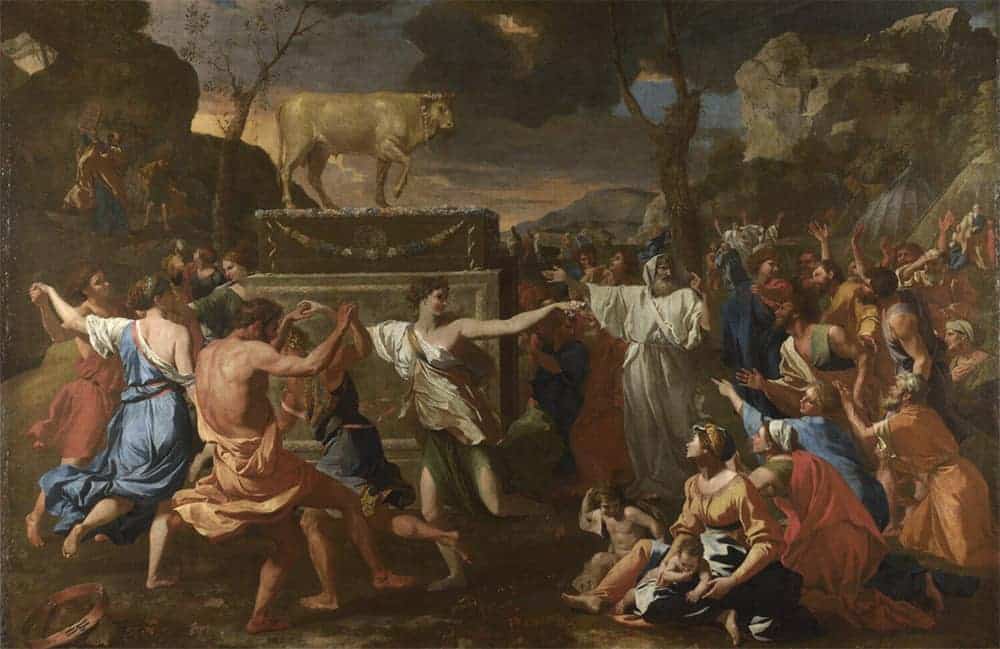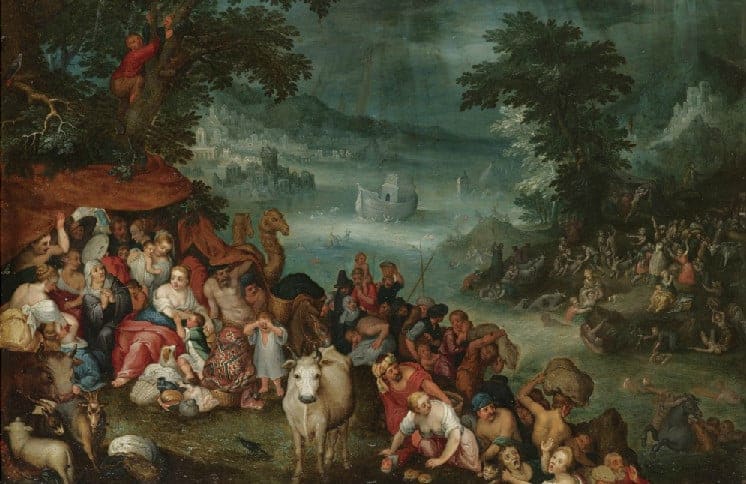While not all may know about the story of the Fall of Man, and while not all may understand the story of the Fall of Man, all can nonetheless tell as well as the man next to him that something isn’t quite right with the world. Pick up the newspaper, open up your computer, turn on your smartphone, and it seems our world is wrought with nothing but destruction and despair. Students at the Denver Catholic Biblical School are often surprised as they study the Old Testament to find that it seems to be no different in Scripture. “Shouldn’t the Bible look and sound different from the newspaper and computer and smartphone,” they ask? To which we answer…certainly not, if the Bible is telling the story of salvation history, which is the story of man needing to be saved!
As we repeat in our Biblical School classes, “sin begets sin.” And so we see, immediately upon exile from Eden, that the human race spirals out of control and into endless cycles of chaos. Cain murders his brother Abel. Noah’s Flood brings destruction, the Tower of Babel sows division. The patriarch Abraham has sons, grandsons, and great grandsons who war with one another. The patriarch Joseph saves his family Israel from famine, but his people end up oppressed and enslaved in Egypt by a new Pharoah. Moses liberates Israel from Egypt in the Exodus with the 10 Plagues and parting of the Red Sea, only for the apostasy of worshipping the Golden Calf to follow. The Israelites refuse to enter the Promised Land and instead wander the wilderness for 40 years, during which they turn away from God over and over again.
Even when the Israelites do enter the Promised Land, they end up living no different from the pagans before and beside them. The people reject God as their king, which leads to the institution of the Davidic Kingdom. But even then, the greatest of all the kings, King David, falls into the sin of adultery and committing murder. The Davidic Kingdom splits into two, the Northern Kingdom of Israel going into exile at the hands of the Assyrians in 722 BC and the Southern Kingdom of Judah going into exile at the hands of the Babylonians in 586 BC, with Jerusalem and the Temple destroyed. The Jews return from exile, but never have it the same as before, always living under foreign rule, eventually leading to the Maccabean revolt against their Greek persecutors one and a half centuries before the coming of Christ.

Reading all of this in the Old Testament can leave one aghast at what seems like a never-ending spiral into depravity once sin has entered the world (and to think…you study all this in just the first year of the Biblical School!). No sin remains uncommitted, either: from idolatry to child sacrifice to religious ritualism to the oppression of the poor to murder to adultery, God’s people and the pagans indulge it all.
But why is there such a shocking descent into sin, a tide that cannot seem to be reversed in the Old Testament? Precisely because sin is an offense against God, which man therefore cannot atone for. After all, how is the creature supposed to appease the justice of the Creator? How is the finite ever supposed to “balance out” the scales of justice of the Infinite? When man commits sin, he incurs a debt towards a God, a debt that he cannot pay off. We already owe God everything that we are for his having created us. But now, we have additionally committed, in Adam, an offense against God by rejecting his law, plus whatever other personal sins we have committed.
Thus, we have rejected God’s supernatural life within us by grace and we are thereafter in debt to him. It’s like the gambling addict that continues to “double down,” only to continue to lose more and more money. For man can neither atone for his own sin, nor the sins of others, and is therefore left stuck in the mud with nowhere to go but further and further down. This is why St. Paul speaks of the time of the Old Testament as a time of enslavement, specifically enslavement to Satan, sin, and death. Hence, man needs a savior…precisely because there is something that he needs to be saved from!

Is there any hope in all of this in the Old Testament, or is the story of salvation history simply one long, depressing tale of offenses against the Almighty? Thankfully, this is where the promises of salvation from God come into the equation, promises such as those given to the patriarch Abraham of a worldwide blessing to come from his lineage or the promise to King David of an everlasting kingdom. Likewise, the prophets, famous for “doom and gloom” preaching, but sadly not as famous for the restoration in God that they simultaneously preach, also constantly speak of something “new” that God promises for his people: if his people but return to him, then he will give them a new heart, a new spirit, a new covenant, new shepherds, and a new creation. Yes, the Old Testament is filled with wrath and bloodshed and all of the evils that man can come up with, but there’s also the beautiful thread of the promise of redemption throughout. This is another thing that our students at the Biblical School marvel at: not just the carnage of the Old Testament, but the beautiful love of God throughout, ever seeking to restore man to his grace at the repentance of his sins.
However, to any faithful observer during the Old Testament days, God’s promises had yet to come to fruition in the Old Testament and therefore awaited their fulfillment. But one could also rest assured knowing that they would come to fruition, precisely because, as St. Paul writes in his epistles, God is faithful to his promises. Of course, redemption may not happen when or how we would like or expect it to, but it certainly will happen. In fact, this is precisely why St. Paul writes that the righteous of the Old Testament are models for us, because they believed in the promises of God without seeing them come to fruition: “These all died in faith, not having received what was promised, but having seen it and greeted it from afar, and having acknowledged that they were strangers and exiles on the earth” (Heb 11:13). Furthermore, not only has God promised the offering of salvation to man, but one could also rest assured knowing that he had proven himself faithful before. The Exodus, for example, became the paradigmatic event of liberation for God’s people, and as such the prophets also continually preach of a new Exodus to one day come: a true liberation for man from his real enemy of Satan, sin, and death.
To any faithful observer, it would also be perceived that this promise of a true liberation didn’t just come during the era of the prophets or kings or patriarchs, but in fact went all the way back to the beginning. For as we read in Genesis 3:15, when God speaks to the ancient serpent, “I will put enmity between you and the woman, and between your seed and her seed; he shall bruise your head, and you shall bruise his heel.” The “you” here is Satan, the “woman” is the Blessed Virgin Mary, “your seed” is all of the evil one’s minions, and “her seed” is Jesus Christ. And while to bruise the heel is to inflict pain upon somebody (which happens, of course, in the Passion of Christ), to attack the head in ancient cultures is an authoritative and definitive victory; attacking somebody’s head symbolizes that you are going after their very life (hence King David cuts off Goliath’s head).
Bring all of this together and we see that the infinite mercy of God is astounding. God’s infinite justice demands that man pay the price for Adam’s sin in the Garden, but his infinite justice never acts absent his infinite mercy, precisely because his infinite justice is his infinite mercy. And so we see in Genesis 3:15 that in the midst of this unspeakably heinous crime against God – one cannot ever overstate the catastrophic nature of sin – God preaches the Gospel of Christ crucified and the Blessed Mother to Adam, Eve, and Satan. God, who is so infinitely just that man is rightly punished for sin, is also so infinitely merciful that he doesn’t want to leave us languishing in sin, doesn’t want death and sin to have the last word. Not only that, but the way in which he will redeem us from sin: the second Person of the Most Holy Trinity, the Word, God himself, will actually become man and let himself be killed in the most horrific, brutal, disgusting form of death, offering himself as a sacrifice for the forgiveness of sins for the very people who are torturing and executing him.
It is utterly mysterious just how much God loves you, that he’d die for you on the cross! No matter how hard you tried, you couldn’t write a better story about mercy than this. As we pray from the Exultet of the Easter Vigil: “O happy fault that earned for us so great, so glorious a Redeemer!”





